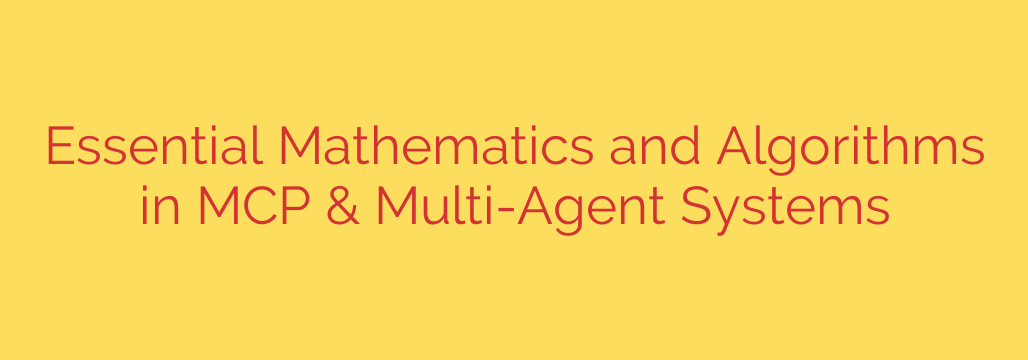
Understanding how systems with multiple intelligent agents interact and cooperate is a fundamental challenge in modern computing and artificial intelligence. Achieving effective coordination, communication, and collective problem-solving in multi-agent systems relies heavily on a robust foundation in mathematics and the application of sophisticated algorithms.
At the heart of designing and implementing successful multi-agent systems lies a blend of mathematical disciplines. Linear algebra is crucial for representing agent states, transformations, and the dynamics of the system. Concepts like vectors, matrices, and transformations are essential for modeling agent movements, sensor data, and interaction protocols. Calculus provides the tools for understanding continuous system dynamics, optimization processes, and analyzing how changes in one agent’s actions might affect others or the system’s overall performance.
Probability and statistics are indispensable for dealing with uncertainty, which is inherent in real-world multi-agent environments. Agents often operate with incomplete or noisy information about the environment and other agents. Probabilistic models like Bayesian networks and Markov decision processes (MDPs) are used for decision-making under uncertainty, learning from observations, and predicting the behavior of other agents.
Perhaps one of the most critical mathematical frameworks is game theory. This branch of mathematics studies strategic interactions among rational decision-makers. It provides models and concepts like Nash equilibrium, Pareto efficiency, and cooperative/non-cooperative games, which are vital for analyzing agent interactions, designing reward structures, and achieving desired collective outcomes in scenarios ranging from resource allocation to complex negotiations. Graph theory is also invaluable for modeling agent relationships, communication networks, task dependencies, and the structure of the environment itself.
Building upon these mathematical foundations, a variety of algorithms enable multi-agent systems to function effectively. Optimization algorithms, including convex optimization, genetic algorithms, and reinforcement learning methods, are used for finding optimal strategies or parameters for individual agents or for optimizing the collective performance of the system. Agents might use these to find the best path, allocate resources efficiently, or minimize costs.
Search algorithms, such as A* search or minimax, are fundamental for planning and decision-making, especially in environments with discrete states or where agents need to explore possible future scenarios. In multi-agent settings, these extend to algorithms for coordinating searches or planning in shared environments.
Machine learning algorithms, including supervised learning, unsupervised learning, and particularly reinforcement learning, empower agents to learn from experience, adapt to changing environments, and improve their decision-making over time. Reinforcement learning is especially powerful for training agents to perform complex tasks through trial and error, often in competitive or collaborative multi-agent scenarios.
Specific coordination algorithms are designed to manage interactions between agents, such as contract nets, negotiation protocols, and distributed consensus algorithms. These ensure agents can work together towards common goals, resolve conflicts, and synchronize their actions effectively.
In summary, the successful development of sophisticated multi-agent systems critically depends on a deep understanding and application of essential mathematical concepts from linear algebra, calculus, probability, game theory, and graph theory, combined with powerful algorithms drawn from optimization, search, and machine learning. This interdisciplinary approach is key to building intelligent, adaptive, and coordinated agent collectives capable of tackling complex real-world problems.
Source: https://feedpress.me/link/23532/17061783/the-silent-role-of-mathematics-and-algorithms-in-mcp-multi-agent-systems








